The Story Of The Plastic Visitation
Editor’s Note: The Plastic Visitation is composed of some members from ’69. The group has played at several of our reunions, and they will play at our 50th Reunion as well.
This history of the group will give you the backstory.
The Band, 2015
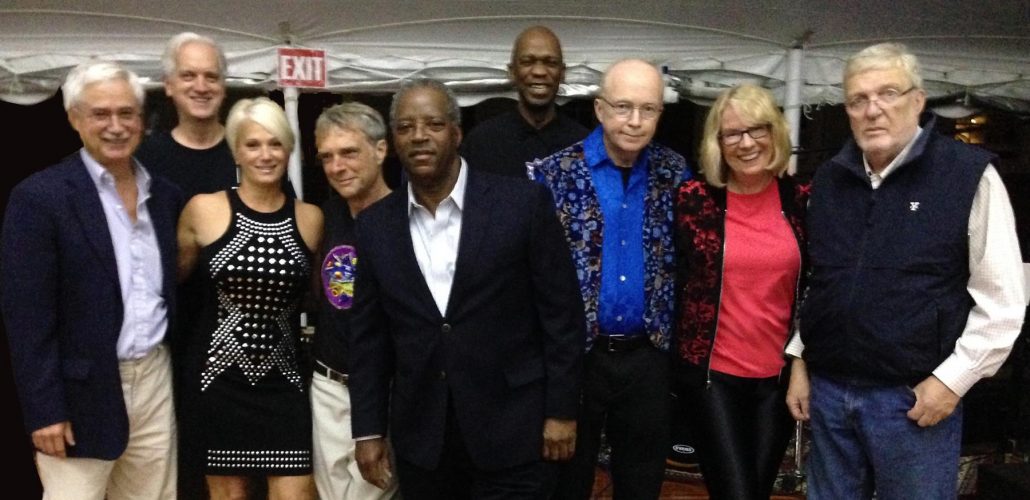
The Prehistory
At Yale in the fall of 1966, four upperclassmen put a band together. Tom Picton (Trumbull ’69) sang, Mike Farmer (’67) played electric piano, John Armstrong (TD ’69) played guitar, and Doug Leonard (TD ’69) played drums. They needed a bass player, so they recruited freshman Alex McNeil. They called themselves the Underground Movement.
After playing a few months and a few unmemorable gigs (including one at UConn in Storrs), the Underground Movement fizzled out. Mike was graduating, and Tom and John had decided to quit school at the end of the year. Still wanting a band, Doug and Alex set out to put a new group together by June (1967). The plan was that the guys would come back to New Haven when the residential colleges opened in September, rehearse, and get some gigs during the busy fall season, when there were lots of mixers and parties.
Forming the Band
Doug and Alex needed a guitarist, a keyboardist, and a lead singer. One of Alex’s roommates knew freshman Tinker Sawyer, as they were both from Portland, Maine. Tinker played guitar and sang and was interested. Alex and Doug had also heard about another freshman, Rick Blum, who played organ. Rick too was interested in joining the new band.
Now they needed a lead singer. They put up notices on campus in May and got quite a few responses. They auditioned several people, but no luck. Then sophomore Lou Popp showed up and impressed everybody with his vocal chops. The lineup was set—or so it seemed.
What About a PA System?
Although Doug, Alex, Tinker and Rick all owned instruments and amps, nobody had any PA equipment — microphones and speakers — for the vocals. This would cost some money. One of Alex’s dormmates, freshman George Reese, came to the rescue. George agreed to loan the new band about $700 to buy equipment ($4,000-5,000 in today’s economy); the band agreed to pay him back with interest. Over the summer the band acquired a few microphones, a couple of speaker columns, and a pretty fancy (for those days) amp-mixer-echo chamber made in Germany.
It was also over the summer that they settled on a name for the new band. Nobody remembers exactly who came up with The Plastic Visitation (Alex thinks it may have been him; Doug thinks it was Rick), and nobody particularly liked the name, but it stuck. This was the era when names like the Jefferson Airplane and the Strawberry Alarm Clock were in vogue.
September 1967: School Starts
Doug, Alex, Tinker, Rick, and Lou all showed up the day the dorms opened and started rehearsing. They had a good place to practice. Over the summer some of Tinker’s friends in Yale’s Branford College had renovated the college basement (mostly by painting the walls) and turned it into an entertainment space; they named it Debasement. The new band practiced there, and could perform some gigs there.
After a few days they’d put together a repertoire of songs. They decided to “audition” themselves in Debasement on Monday, September 18, and invited many of Yale’s residential college social chairmen. The audition went well. The band was immediately hired for a mixer at Yale Law School on Saturday, September 23, and would do a warm-up gig at Debasement on Friday night.
Tuesday, September 19, 1967
There was only one problem. Lou had strained his voice at Monday’s audition. He called Alex on Tuesday morning and invited him to lunch at Calhoun College. At lunch, he told Alex, “I don’t want to do this.” It wasn’t just that he’d strained his voice—he’d decided that he didn’t want to be in a band.
That was a big problem. Two gigs coming up in a few days, and no lead singer! Doug and Tinker each sang some lead vocals of their own, but neither of them wanted to take on a lot more vocal responsibilities. Where would the band find a new singer on such short notice?
Enter Ralph Dawson
On Tuesday night (or maybe it was Wednesday) Rick stopped for something to eat at the Buttery in the basement of Durfee Hall on Yale’s Old Campus. He heard some live music coming from a nearby rec room and popped in. He asked the guys there if any of them sang. They all answered no, but one of them said, “I know somebody who does.” He led Rick over to Wright Hall, one of the freshman dorms, and introduced him to Ralph Dawson. Ralph was interested. As he later said, the chief attraction was financial—if this band was playing some paying gigs, he was all for it.
Ralph had grown up on soul music—Motown, Stax, James Brown, Jackie Wilson, etc. With Lou, the band had worked up a different repertoire. That meant that the band had to learn quite a few new songs in a hurry; fortunately, Rick had played some soul music in his high school days, so that helped.
With Ralph out front, The Plastic Visitation played its debut gig at Debasement on Friday night, earning a whopping $40. The mixer at Yale Law on Saturday paid better—$150. After that, the gigs were steady. The band played at least once almost every weekend through the end of November.
Equipment and Transportation
In the 1960s musical equipment was bulky—and heavy. There weren’t any solid-state amplifiers. Rick owned a real organ and a Leslie speaker cabinet. Both required at least two people to move them, and going up and down stairs was a pain. Tinker and Doug had cars, but they were too small to carry the big pieces. We even had some lights.
When the band got its first out-of-town gig on October 21 at Mt. Holyoke College, the guys decided to buy a vehicle. Preferably a cheap one. They learned that another local band, the Shags (who actually made a record or two), had something for sale. In no time The Plastic Visitation had themselves a 1954 Cadillac hearse for only $200.
Driving it back to New Haven, Rick was stopped and detained by the city police for operating an unregistered vehicle; fortunately, the Yale Police Department got involved and straightened things out. In a few days, Tinker got it insured and registered with Maine plates.
The hearse proved pretty reliable. The guys immediately invested in new tires. One night the hood flew up on the way to a gig. After that, the band used a padlock and chain to keep it closed. Soon the guys realized it was wise to drive with extra transmission fluid and brake fluid. It’s too bad there aren’t any photos of it (Tinker painted “Ask About Our Specials” on the back), but this is what a 1954 Cadillac hearse looked like:
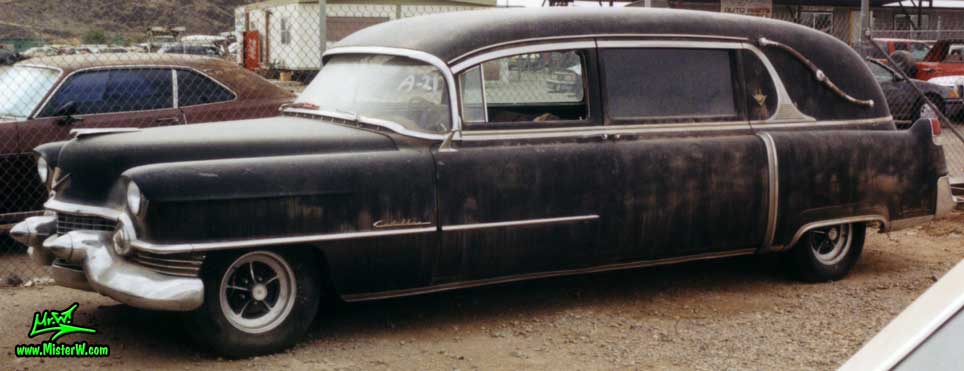
A Loss
The hearse could easily hold all the equipment, which meant there was no need to unload stuff back in New Haven after a gig (except for guitars and other little things that might be damaged by cold weather).
The hearse was initially kept in the back of a car wash that was located on Elm Street close to campus. Why five, supposedly smart, college students thought it was a good idea to leave stuff unattended all night in a city remains a mystery. Sure enough, within a couple of weeks the hearse had been broken into, and most of the equipment was gone. Rick’s organ and Leslie weren’t taken, probably because they were too bulky. And Doug wasn’t heartbroken that most of his drums were gone, as he hated that old kit. The theft even made the national news—Paul Harvey noted it in his nightly radio newscast because the stuff had been swiped “from . . . a hearse.”
Miraculously, there was a happy ending. When he insured the vehicle, Tinker had managed to get coverage for theft of contents. In short order, he received a check for about $1,500. Several of the guys then piled into the hearse one weekday afternoon, drove to Manny’s, the famous music emporium on West 48th Street in New York, and replaced what had been lost. After that, Rick found a private garage for the hearse in a quiet residential neighborhood near campus. It cost $10 a month.
A Typical Gig
In those days most college gigs were from 9 PM to 1 AM. Driving in the hearse and one or two other cars, the band would arrive about an hour early, set up, and do a quick sound check. Most bands played four 40-minute sets with 20-minute breaks. The band always preferred to play more music, usually doing three longer sets (60-70 minutes) with shorter breaks. The band played 40-45 songs a night.
The Plastic Visitation played for people to dance; despite the trippy name, it wasn’t a “jam” band, so it didn’t play many long songs. Ralph sang about two-thirds of the leads. Doug and Tinker did most of the rest. Tinker had written some songs, including “Holly,” “I Just Dream About Cream” and “Who Wants My Love.”
Rick had two leads (“Boys” and “Shout”); Alex didn’t sing any leads in those days. Rounding it out were a couple of instrumentals, “Spooky” and “Harlem Nocturne.”
“This Old Heart of Mine” and “Reach Out I’ll Be There” were first-set staples; “Light My Fire” was often the last song of the second set; and “A Whiter Shade of Pale” was usually the evening’s finale.
Over the course of two and a half years, the band played about 100 different songs. It often added new hits to the repertoire as they came out. For example, Doug picked up the Beatles’ “Lady Madonna” in the spring of 1968, and Ralph started doing Archie Bell & the Drells’ “There’s Gonna Be a Showdown” in early 1969.
When the music finished at 1 AM, the band then had to pack up. If the gig was out of town, that meant driving back to New Haven, sometimes arriving home at 3 AM or later.
Doug and Alex’s girlfriends accompanied the band to quite a few gigs. Mary Beth (M.B.) Skelly, who went to Albertus Magnus, and Jill Spencer, who went to Drew U. in New Jersey, became good friends. When they arrived with the band at one prep school gig in New York state, they were informed that the women wouldn’t be admitted unless they were part of the band; so that night there were two extra tambourine players.
The 1967-1968 School Year
Between September 1967 and May 1968 the band played 34 gigs, at Yale (14 times), Mt. Holyoke, Albertus Magnus, Manhattanville, Wesleyan, and Amherst Colleges; St. Raphael’s Nursing School; three local high schools and a prep school; and a few clubs (The Mod Scene in North Haven, The Red Garter in Meriden, The Single Surf Club in Seymour, and The House of Zodiac in West Haven). The group grossed $5,400 ($32-36,000 in today’s money), with expenses of $1,650 (including paying George Reese half of what he was owed). The Plastic Visitation even had its own checking account.
Summer 1968
When school ended in late May, Tinker decided to return home to Maine. Doug, Alex, and Ralph stayed in New Haven and found summer jobs. Rick had lined up an internship at a hospital on Long Island. Armed with a cassette demo tape the band had made at Doug’s parents’ house in Darien, Rick soon landed the band a gig at the Garden Chop House, a bar/restaurant in Garden City, Long Island. The temporarily four-piece Plastic Visitation carried on.
Norman Butler, the owner, wanted to see if live music would increase business on Wednesday and Thursday nights. Apparently, it worked. The band played there two nights a week from late June to late August. After a few weeks, this led to more gigs nearby, playing Friday and Saturday nights at the Straw Hat in Mineola. Most nights the band played for only three hours, instead of four, and could leave all the equipment at the venue, which was a big plus. There were 27 gigs over nine weeks.
This was easy enough for Rick, who lived and worked close by. But for the other three, it was more grueling. After finishing work in New Haven on Wednesdays, Alex and Ralph piled into Doug’s VW Beetle for the drive down to Long Island. The three drove back to New Haven late Wednesday night, repeated the process on Thursdays, and again on quite a few Fridays and Saturdays; once in a while they’d sleep over on Long Island on Friday night.
Fall 1968
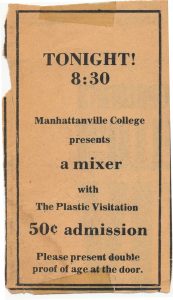
As the school year started again, Doug was now a senior, Alex, Rick, and Tinker juniors, and Ralph a sophomore. Tinker rejoined the group after a summer in Maine. The first gig was at Holy Cross University in Worcester, MA. Everyone thought the music sounded pretty good. The band kept busy throughout the fall, playing at Marymount and Vassar in New York, Mount Holyoke, and Albertus Magnus, as well as at Yale. The money was better this year. Maybe the band was better, too.
Enter Don Roman
Also in the fall, the band added a sixth member, Don Roman. Don, who roomed with Ralph, played alto sax and sang backup. The first gig as a sextet was at Yale’s Timothy Dwight College on November 2. A couple of weeks later Ralph borrowed a reel-to-reel tape recorder so that the band could record itself live at Branford and Jonathan Edwards Colleges. These are the only surviving recordings of The Plastic Visitation. Unfortunately, there’s some distortion on them, but it shows that the band was good!
Exit Tinker
After a gig at the New Haven Lawn Club on December 20, Tinker announced that he was leaving Yale. He recommended a successor, sophomore Ralph Wolfe, who started rehearsing with the band after the holidays. Ralph W., who was nicknamed “Step” by Ralph D. (after the group Steppenwolf), played guitar left-handed, wore wire-rim glasses, sang a few lead vocals (he was a big Beatles fan), and also rolled his own (tobacco) cigarettes.
Spring 1969
The first gig with Ralph W. was February 1 at Davenport College’s Mardi Gras party. Again, the band kept busy that Spring, with fourteen gigs. The most unusual one may have been a weeknight fashion show for Gant Shirts, sponsored by Esquire magazine. How Esquire ever heard of the band remains unknown. The fee was $200, but somehow the band got paid twice. The guys also took in some good money this semester: $500 at Pierson College, $450 for a post-prom party at Hamden High School, and $450 for the Vassar Senior Prom. For the school year, The Plastic Visitation grossed $8,400 (about $50,000 in today’s money). It was able to pay off the debt to George Reese (with interest), keep the hearse running, and upgrade some equipment.
Summer 1969
It was a relatively quiet summer. Alex had a job in Philadelphia, so he wasn’t around. Neither was Don. Rick was newly married and had moved off campus. With a substitute bass player (a friend of Ralph Wolfe) and without a saxophonist, the group played two gigs. Alex did spend part of the summer on band business—getting the hearse registered in Pennsylvania under his name.
Fall 1969
As the school year got underway, Alex and Rick were now seniors; Ralph D., Don, and Ralph W. were juniors. Doug had graduated and had moved to New York City to attend NYU Law School. Obviously, a drummer was needed. Tinker came to the rescue; he persuaded his younger brother David Sawyer, who played drums and had just graduated from high school, to enroll at New Haven College. David owned a vintage Jaguar with a quirk—it wouldn’t go in reverse. But he always had the knack for finding a parking place that allowed exit from the front, which was not easy in downtown New Haven. This sextet played a few gigs in September and October.
Add Some Horns
Wanting a bigger sound, the band added two horn players, both sophomores: Ken Barish on trumpet and Gary Daniels on tenor sax. Joining Don on alto sax, they were a full horn section. The group added songs like “25 Miles” (Edwin Starr) and “Sing a Simple Song” (Sly & the Family Stone) to the repertoire. On some gigs the band was also joined by a percussionist, senior Glenn DeChabert. The band officially shortened its name to the Visitation.
The new lineup debuted at Jonathan Edwards College on November 8. Two weeks later the band played to its largest audience ever (well over 1,000), when it opened for the Chambers Brothers at a university-wide dance in the Commons Dining Hall. The Chambers Brothers were riding high on the strength of their huge national hit, “Time Has Come Today.”
Car Trouble and More Personnel Changes
On December 5 and 6 the band played at Mount Holyoke College. Ralph W. volunteered to drive the hearse back to New Haven. He made it, but the hearse didn’t—it died not far from Mount Holyoke. Ralph had it towed to a garage and came back on his own. On Monday, Alex and Dave Sawyer rented a van, drove to the garage, loaded up the equipment, and left the hearse for junk.
Perhaps not surprisingly, Ralph Wolfe decided to leave the band. And so did Rick, who by now had a new baby daughter and was busy applying to med school.
1970—Wrapping It Up
Rick and Ralph W. were replaced by two local musicians from New Haven. This lineup (again) played Davenport College’s Mardi Gras party in mid-February. After that Alex and David Sawyer decided to leave the band. Alex, now engaged, was applying to law school. Envisioning that his musician days were over, he sold his equipment.
Alex and David were also replaced by local musicians, so the Visitation was now half Yalies, half “townies.” The band soldiered on. In the spring Don got the band a gig at his girlfriend’s school, Knox College in Galesburg, Illinois, 1,000+ miles from New Haven. Things didn’t go quite as planned—the band was supposed to play two gigs, but ended up only doing one. Worse still, on the way home the van with the equipment slid off the road during a rainstorm in Pennsylvania. Fortunately, no one was seriously injured.
The Reunions
As everyone went their own way in the 70s, Alex and Doug stayed in touch and saw each other regularly. Ralph D. and Don also stayed in touch with each other. In 1982 Alex organized the first “P.V.” reunion, held at Rick’s house in Kingston, PA. The original five guys—Doug, Alex, Rick, Tinker, and Ralph—got together for the first time since 1968, and made a little music in Rick’s basement. It was a lot of fun. Band offspring played together, enjoying the music, the tricycles, and the pool.
In 1989 Doug and Mary Beth organized another reunion at their place in Brooklyn, Connecticut. This time the band would actually be playing a real gig for a real audience—under a big tent in the yard for the Leonards’ friends and neighbors. Young and old had fun.
These P.V. Reunions were repeated at the Leonards’ several times in the 1990s and early 2000s. Starting in the early 1990s the sound was again augmented by adding three more people—Chuck Boisseau (a colleague of Doug’s) on guitar, and Karen Kalna Blum (Rick’s wife) and Jill McNeil (Alex’s wife) on vocals.
This group started playing Yale class reunions, beginning in 1995 with the Class of 1970’s 25th reunion. The Plastic Visitation has done all of the Class of 1969 and Class of 1970 reunions since. Don Roman joined the group for the ’70 reunion in 2015. Here are some iPhone clips of songs we did there:
The band still plays quite a few of the songs from its original repertoire, though it’s brought the keys down on some of them (well, most of them). It has also added some songs for Chuck, Karen, and Jill to sing. A few post-1970 tunes have found their way into the set lists, too.
Postscript
Doug Leonard and Mary Beth Skelly eloped, getting married in Maryland in November 1968 (on a weekend when the band didn’t have any gigs). They tied the knot again in Connecticut in 1970. Doug became a lawyer and practiced in New York for a few years. In the mid-1970s he and Mary Beth purchased an old barn on four acres in Brooklyn, Connecticut. They drove up from NYC on weekends, renovating it according to Doug’s plans, and finally moved in by the end of the decade. Doug continues to practice law, and he and Mary Beth have reconverted their residence into a guest house, The Barn at Gray Mare Hill. They have three children and four grandchildren.
Alex McNeil and his longtime girlfriend, Jill Spencer, got married in New Haven in June 1970. Rick played organ. Alex too became a lawyer; he’s now retired. By the mid-1980s Alex realized that he missed being in a band, so he and Jill formed an oldies group that still gigs occasionally (Chuck Boisseau plays guitar). Alex and Jill live in Newton, Mass., and have two children and seven grandchildren.
Tinker Sawyer lived in several places and worked in several fields before returning to Maine in the 1980s. He lives in Northport, where he buys, sells, and renovates houses. He also continues to make music. Married to Marsea Ryan, he has three children and four grandchildren. He’s now known as Buck Sawyer, but will still answer to Tinker.
Rick Blum became a physician, with a practice in Kingston, PA, just across the river from his home town of Wilkes-Barre. He too organized an oldies band that still performs, and includes Karen Kalna Blum, who’s been married to Rick since 1990. Rick has two children and two grandchildren.
After spending some extra time in New Haven, Ralph Dawson also became a lawyer. Specializing in labor law, he was a partner in the Manhattan office of a national law firm, and is now semi-retired. He and his wife, Leslie Demus, have two children. They live in New Rochelle, NY.
Don Roman is the fourth lawyer of the group. He has been senior counsel for a major corporation and was also a partner in a law firm. He later became a financial advisor. Now retired, he lives in suburban Atlanta. He has four children.
Sadly, not everyone is still living. Ralph Wolfe, who became an architect, died of metastatic melanoma in 1993 at age 43, leaving a wife and two children. Glenn DeChabert died of lung cancer in 1994 at age 46. Lou Popp (the very first vocalist) passed away in 1996 at age 48. David Sawyer (who became a professional drummer) also died of metastatic melanoma in 1997, also at age 48. They are all missed.

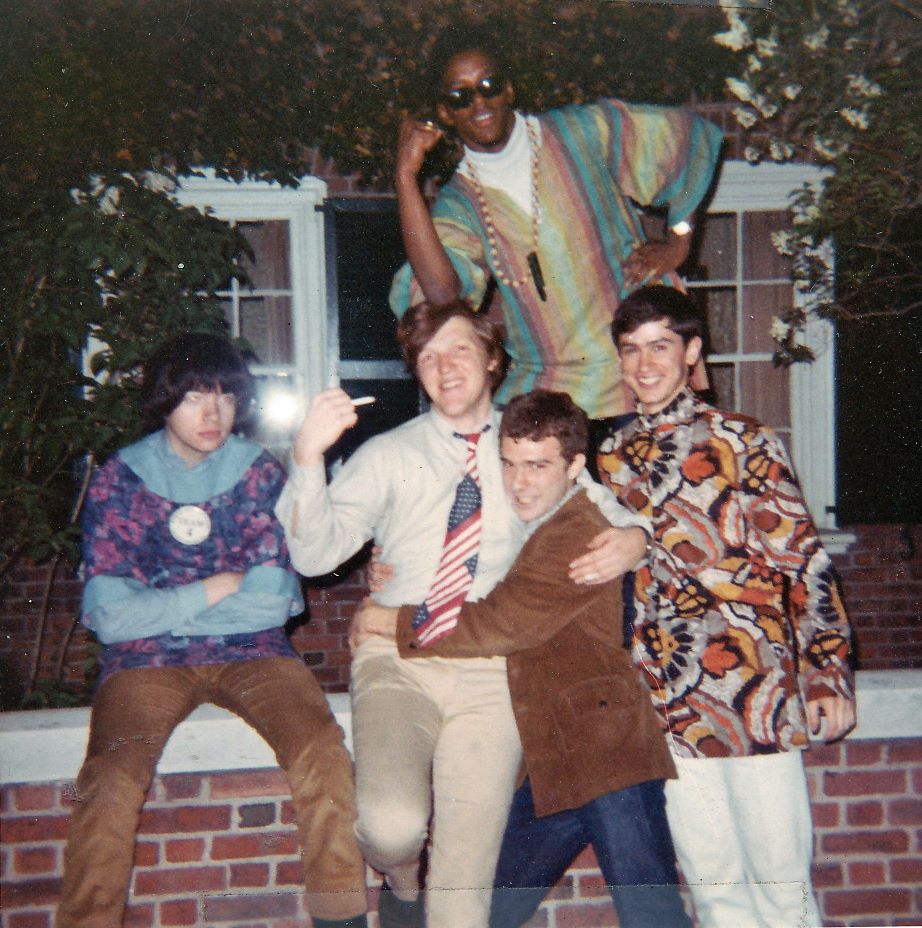
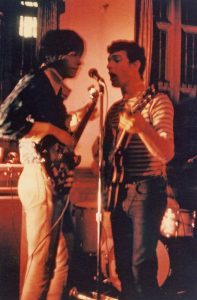
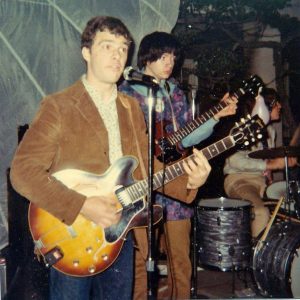
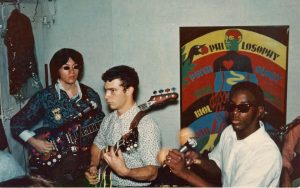
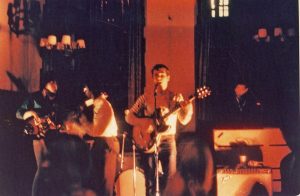
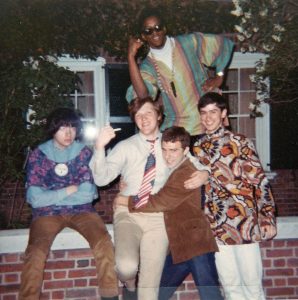
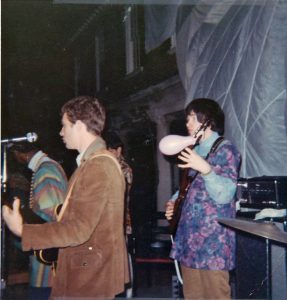
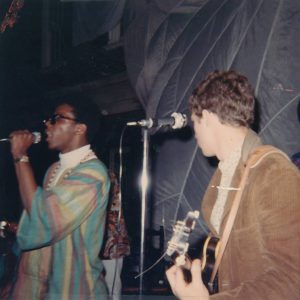
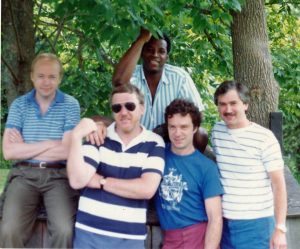
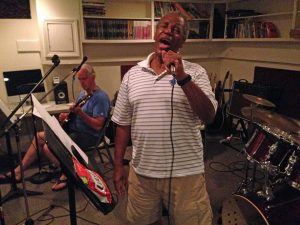
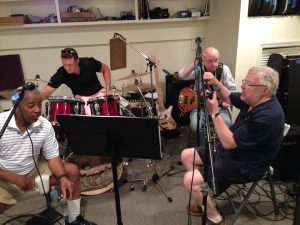
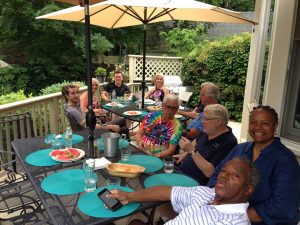
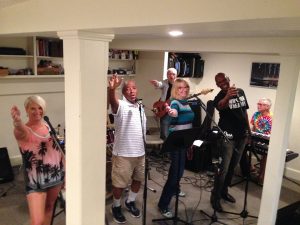
A great history! Doug and M.B., I’ve know you for many years, as well as Alex and Jill, and John Armstrong, but most of this is new to me. I heard a number of the band’s performances during our college years, and I’ve danced to the band’s performance at every single Class of ’69 Reunion. I wish I’d made the acquaintance of the hearse! Thanks for the memories, especially to Alex for writing the history, and I look forward to seeing all at the fiftieth.
Herb Stiles
I ditto Herb’s comments as a fellow TDer. A fascinating, well crafted read of the rise and fall and rebirth of a beloved band.
Having been in a band for 5 years in the 70s, I smiled at all the ups and downs of member switches, missing equipment, and car breakdowns. Look forward to once again dancing the night away with such a great group of musicians.
Jay Castelli, ’69, TD